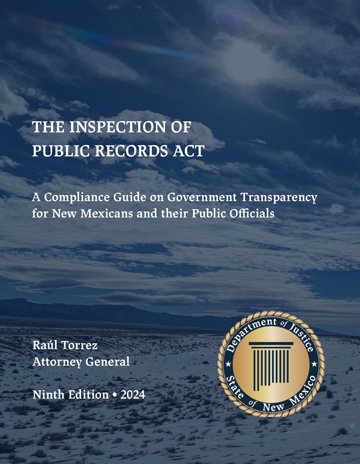They hate the fact that ordinary folks can use the law to force them to expose and provide documents that they don’t want out in public. And they despise the fact that the law forces them to do their jobs and provide this information, no matter what a pain in the neck they consider the requests to be.
So they sneak, they weasel, they come up with all kinds of tricks and ruses to get around fulfilling a request without exactly breaking the law.
But in New Mexico, this time, they blew it.
“New Mexico State Police, a publicly funded agency that should aspire to be at the highest level of accountability, has refused to serve the public.”
The New Mexico Foundation for Open Government (NMFOG) decided it was time to blow the thick, pea soup fog off of state government by filing a lawsuit against the New Mexico Department of Public Safety (DPS) in the First Judicial District Court in Santa Fe.

The lawsuit represents the interests of a number of reporters in the Land of Enchantment, revealing the trickery used by bureaucrats to delay and deny their freedom of information requests.
“They cover such a range of investigations that are of public concern, so this lack of accountability at such a broad level is important and needs to be addressed,” NMFOG Legal Director Amanda Lavin said.
Journalists from the Santa Fe New Mexican, Searchlight New Mexico, Source New Mexico and the Rio Grande Sun, whose requests were delayed for months, are featured prominently in the watchdog group’s lawsuit. In their exasperation over the delays, they turned to NMFOG for help.
“It’s unfathomable that New Mexico State Police, a publicly funded agency that should aspire to be at the highest level of accountability, has refused to serve the public,” New Mexican Executive Editor Bill Church wrote.
“This is repetitive bad behavior.”
Several requests for information on an assault at a New Mexico Children, Youth and Families Department office, for example, were delayed for roughly nine months.
Prior to that, DPS workers, who handle records for the New Mexico State Police, had said they were “unable to locate any records responsive to NMFOG’s request.”
But then, magically, after nearly nine months, the records appeared.
How convenient.
Here’s how the bureaucratic hustle works: The law requires that requests be handled within 15 days, but there’s a handy little trapdoor—a “sorta” legal way of avoiding that 15-day requirement.
The New Mexico Inspection of Public Records Act (IPRA) states: “If a custodian determines that a written request is excessively burdensome or broad, an additional reasonable period of time shall be allowed to comply with the request.” [Emphasis added.]
The Act doesn’t specifically define what qualifies as “excessively burdensome” or “overly broad,” instead leaving that judgment to the discretion of the records custodian. In practice, what this means is that bureaucrats can legally delay answering requests until the requesters just give up.
It also means that the very law that is supposed to guarantee public access and transparency gives bureaucrats an easy out, allowing them to drag their feet on requests as long as they please—at least until their shady trickery results in a lawsuit‚ which it now has.
“With each communication, DPS provided a new response deadline it later ignored.”
It’s called “slowrolling” requests in the hopes that those pesky requesters will get frustrated from the overly long delays and just go away—a very common technique of avoiding freedom of information requests that is used throughout the country by bureaucrats anxious to hide behind unconscionable delays.
Instead of “slowrolling,” they should call it “stonewalling,” which, of course, is what it really is.
There’s also another trick DPS uses to duck out of providing information on criminal matters: They claim they do not provide information on ongoing investigations.
This directly violates a New Mexico Supreme Court ruling that “the fact of an ongoing criminal investigation is not a reason to except public records related to the investigation from inspection,” NMFOG’s lawsuit notes.

NMFOG’s lawsuit further states: “DPS also has a pattern and practice of unlawfully claiming that records are ‘excessively broad and burdensome’ in order to delay or withhold altogether its public records, and not because the request is in fact broad or burdensome.”
“When confronted with the Supreme Court precedent saying they can’t withhold records because they’re related to an ongoing investigation, they then immediately say, ‘Oh, never mind, the request is overly broad and burdensome,’” Lavin said, meaning that requesters still won’t receive the information until long after the cows come home, if ever.
DPS has mastered the art of slowrolling. When one reporter was delayed again and again, DPS contacted him “approximately seven times, each time telling him that ‘due to the excessively burdensome or broad nature of the request,’ DPS needed additional time to fulfill the request,” according to the lawsuit.
“With each communication, DPS provided a new response deadline it later ignored.”
After all this, it’s still painfully clear that voters, legislators and citizens want government transparency and freedom of information laws. All 50 states have one form or another on the books.
But the entrenched bureaucrats and administrators want to protect their little kingdoms from citizens and their demands, which is why they treat open government regulations more as mere suggestions to be ignored than laws to be obeyed.
NMFOG is, accordingly, asking the court to issue an order directing DPS to satisfy the above-described Inspection of Public Records Act requests in full, award damages, costs and reasonable attorney fees and order an injunction to ensure DPS’ future compliance with IPRA.
Sounds reasonable, but what is really needed is an amendment to the IPRA to remove the escape clause that allows bureaucrats to delay responding to requests for virtually forever.
The Church of Scientology has long been a fierce defender of open government laws. As the religion’s Founder, L. Ron Hubbard, famously said: “Democracy depends exclusively on the informedness of the individual citizen.”
Let that sink in: exclusively.
The state would have you believe it agrees.
“Inspecting public records is an important civic action that can enrich policy discussions, encourage free speech, empower local communities, and increase education and understanding of our government. By helping to shine light on the affairs of state and local government, IPRA is a fundamental tool for promoting good government in New Mexico,” New Mexico Attorney General Raúl Torrez wrote.
Now they need to walk the walk.






















